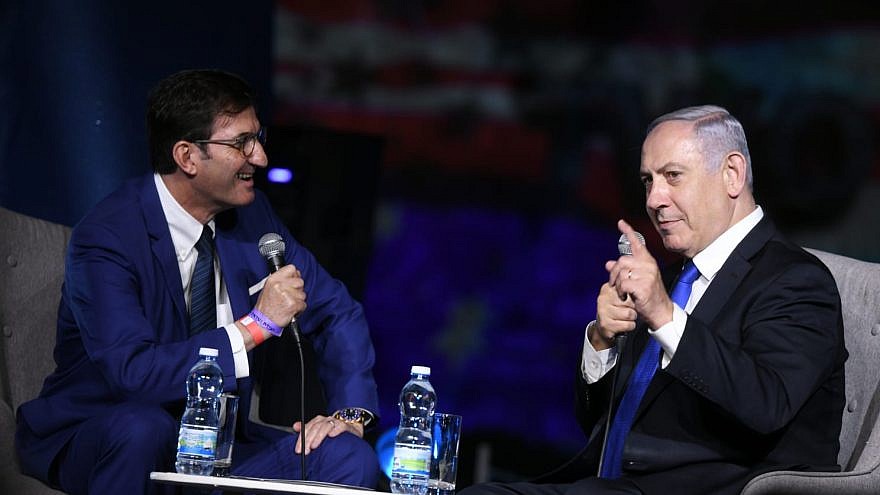Over the past month, headlines in Israel have focused on Israeli politicians and their attempts to change the political landscape in the upcoming second elections slated for Sept. 17, after Prime Minister Benjamin Netanyahu failed to form a government despite winning the most mandates in his political career and an overwhelming victory by Israel’s right-wing majority over its left-wing opposition.
Former Prime Minister Ehud Barak, who handed Netanyahu his only political defeat in the 1999 elections, has announced a second political comeback with the creation of a new left-wing party, telling JNS that he will do “whatever necessary, within the confines of the law, in order to win.” Other parties both to the right and the left are selecting new leaders after electoral failures, and negotiating new political alliances to change the deadlocked outcome of the previous April election.
A reserved and seemingly humbled Netanyahu told editor in chief Boaz Bismuth in a sit-down interview at the “Israel Hayom” Forum last week that “it will be up to the people to decide” if he will continue in the country’s top job, while adding that he “thought the people had already decided” following his apparent electoral victory in April.
Yet for Netanyahu, who will become Israel’s longest-serving prime minister later this month, the weeks since April’s election have been about business as usual—and the validation of a resoundingly successful political, security and diplomatic platform, despite ruling with a lame-duck caretaker cabinet and parliament.
In June, Netanyahu served as host and interlocutor of a trilateral summit between American and Russian national security advisers to discuss Iranian advances in Syria. While the United States and Russia agree on surprisingly little, both countries are committed to Israeli security interests. Netanyahu has dramatically improved relations with both world powers in recent years and gained the respect of both nations’ presidents.
“We are determined to remove Iran from Syria,” Netanyahu said following the summit. “The two superpowers, together with Israel, agree that we must aspire to the goal in which all foreign forces that have entered Syria since 2011 leave Syria.”
In his interview with Bismuth, Netanyahu referred to the trilateral summit as “one hell of a change in our international standing.”
On morning Monday, just days after the trilateral conference, Israel attacked at least 12 Iranian military facilities in Syria in a series of airstrikes, with conflicting reports of as many as 15 killed and 21 wounded, yet with virtually no condemnations from international powers, including the United States or Russia.
Days later, at a graduation ceremony of Israeli Air Force pilots, Netanyahu stated that just as Israel would protect security interests across its border, the Jewish state would similarly create security buffer zones within its own territory, particularly along its longest border with Jordan.
“We do not have much space separating the country’s borders from populated areas,” Netanyahu said at the event. “Hence, we conclude that the area to the west of the Jordan will always be in our hands. If we give up the Jordan Valley, we will ensure that there will be a war.”
Netanyahu delivered a similar message to U.S. National Security Advisor John Bolton during a strategic tour of the Jordan Valley.
The statements represent a significant departure from the views of his predecessors, including former prime ministers Ehud Barak and Ehud Olmert who were willing to offer as much as 95 percent of the West Bank for the creation of an independent Palestinian state. Neither offer resulted in acceptance by the Palestinian Authority, let alone peace.
Meanwhile, at an economic workshop last week in Bahrain, Gulf State leaders openly acknowledged Israel as a legitimate entity in the Middle East—a testament to Netanyahu’s diplomatic initiatives deep into the Arab world over the past several years and proof of the Gulf States’ waning interest in perpetuating Palestinian intransigence.
The Bahrain workshop focused on a plan to invest up to $50 billion into Palestinian areas that would essentially strip Palestinians of their status as victims and refugees, while normalizing relations with Israel. Rejection of the conference by members of the Palestinian Authority further outed Mahmoud Abbas and his cronies as non-democratic despots sitting atop a corrupt kleptocracy unable to reach peaceful coexistence, never mind a negotiated settlement that would end the conflict with Israel.
The conference demonstrated the Netanyahu doctrine that peace with the Palestinians and the greater Arab World would come from the outside in, not inside-out. “First, we make peace with the world, then we make peace with the Arab countries, and then we can make peace with Palestinians. It is the exact opposite of what people said.”
At nearly the same time, Netanyahu this past week continued a policy of de-escalating violence with Gaza—in essence a war of attrition—despite consistent attempts by Hamas and Islamic Jihad to lure the Israeli Defense Forces into a protracted military conflict.
An Israeli incursion into Gaza would most assuredly raise the ire of the international community and would likely result in further crude rocket barrages and the deaths of Israeli soldiers. Such scenarios would not be welcome by the Israeli public, despite calls for harsher action by politicians to both the left and right of Netanyahu, particularly without any acceptable long-term solution readily apparent.
Netanyahu has successfully isolated the Palestinians into two distinct political entities that are dealt with independently by Israel, while displaying Gaza as a case study for what could happen if Israel were to withdraw from additional territories and permanently cede them to Palestinians.
So while Netanyahu has done little so far to campaign for re-election come September, he has done much in the past month to remind Israelis why and how he has been so successful in the past decade.
Alex Traiman is managing director and Jerusalem Bureau Chief of Jewish News Syndicate.


























